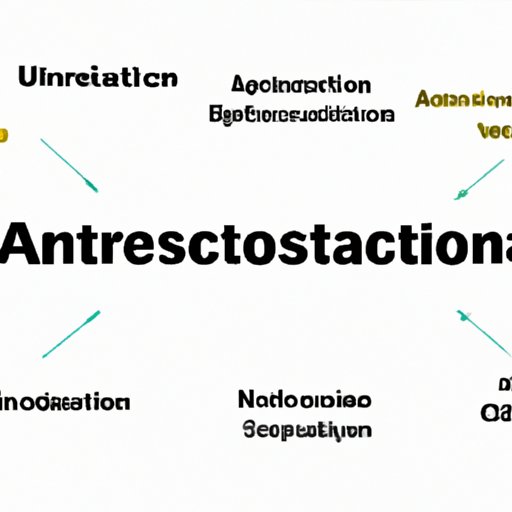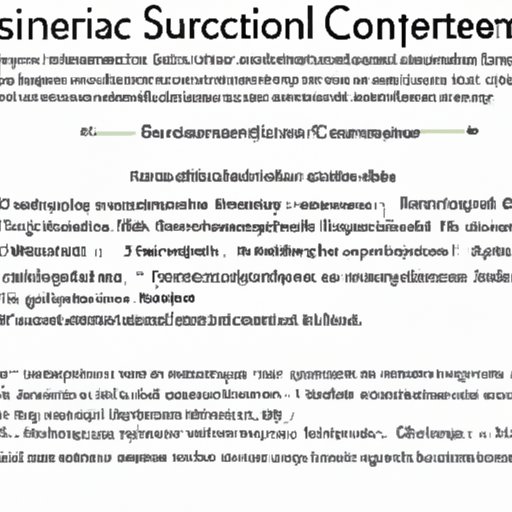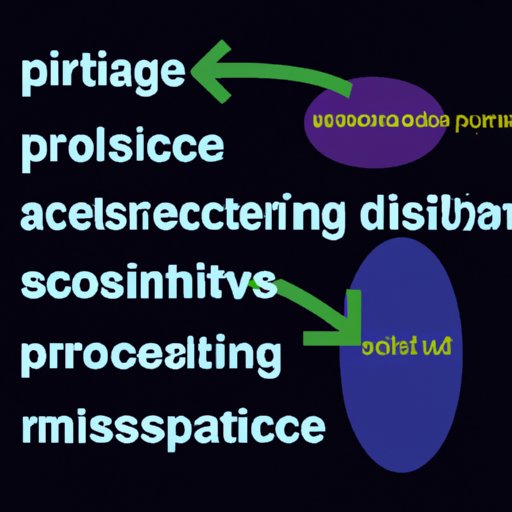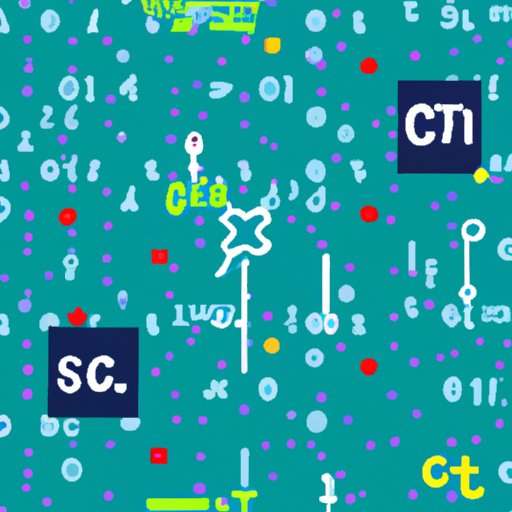Introduction
Computer science is a rapidly expanding field that requires constant innovation and exploration. Abstraction is an important concept used in computer science to simplify complex tasks and make them easier to understand. In this article, we’ll explore what abstraction is in computer science, why it’s important, and the different types of abstraction used in the field.
Exploring the Basics of Abstraction in Computer Science
Before diving into the specifics of abstraction in computer science, let’s start by understanding what abstraction is. According to the Merriam-Webster Dictionary, abstraction is “the act or process of considering something independently of its associations, attributes, or concrete accompaniments.” In other words, abstraction is the process of taking away or removing details to focus on the most essential elements.
In computer science, abstraction is the process of hiding unnecessary details and focusing on the essential information needed to solve a problem. By abstracting away irrelevant details, computer scientists are able to identify patterns and develop solutions more quickly. Let’s take a closer look at the different types of abstraction used in computer science.
Types of Abstraction
There are several types of abstraction used in computer science. The three main types are data abstraction, control abstraction, and process abstraction. Data abstraction refers to the process of hiding unnecessary details about data, such as its physical representation or how it’s stored. Control abstraction involves hiding the details of how a program is controlled and allowing the programmer to focus on the logic of the program. Process abstraction is the process of hiding the details of how a task is performed, allowing the programmer to focus on the overall goal.
These different types of abstraction are used in combination to create software programs. For example, when creating a video game, data abstraction is used to store data about the game’s characters and objects, control abstraction is used to define how the game should be controlled, and process abstraction is used to define how the game should be played out.
Examples of Abstraction
Let’s look at some examples of abstraction in action. When you use a web browser, you don’t need to worry about the details of how it works—you just type in the URL and the browser takes care of the rest. This is an example of process abstraction. The browser hides the details of how it fetches and displays the webpage, allowing you to focus on the task at hand.
Another example is the operating system of your computer. It hides the details of how the hardware works and allows you to interact with the computer using a user interface. This is an example of control abstraction. By abstracting away the details of how the computer works, you can focus on using the computer instead of worrying about how it works.
Understanding Abstraction in Computer Science: A Beginner’s Guide
Now that we have a basic understanding of what abstraction is and the different types of abstraction used in computer science, let’s take a look at how abstraction can help solve problems. Abstraction helps computer scientists break down complex problems into manageable tasks. By identifying patterns, they can work on each task individually and then combine them together to create a solution.
When working with code, abstraction can also help identify the essential elements and hide the unnecessary details. This makes it easier to read and understand the code, as well as identify any potential problems. Let’s take a closer look at how abstraction can help identify patterns in code.
Identifying Abstraction in Code
When working with code, it’s important to be able to identify abstraction. Abstraction can be identified by looking for patterns in the code, such as repetitive tasks or data structures. By recognizing these patterns, computer scientists can create abstractions that will simplify the code and make it easier to understand.
For example, if the code contains multiple functions that all perform the same task, it might be possible to create an abstraction that combines all of those functions into one. This would make the code more efficient and easier to read and understand.

Abstraction in Computer Science: What It Is and How to Use It
Now that we know what abstraction is and how it can be used to improve code, let’s take a look at the benefits of abstraction in computer science. Abstraction can help simplify complex problems and make them easier to solve. It can also help reduce the amount of code needed to solve a problem, which leads to improved efficiency.
To get started with abstraction, computer scientists should first identify the essential elements of the problem. Once those elements have been identified, they can begin to break the problem down into smaller, more manageable tasks. Then, they can identify patterns in the code and create abstractions to simplify the code and make it easier to understand.

An Overview of Abstraction in Computer Science
Abstraction has been used in computer science since the 1950s. Early pioneers of the field, such as John von Neumann and Alan Turing, used abstraction to simplify complex tasks and develop new algorithms. Since then, abstraction has become an essential tool for computer scientists.
Today, abstraction is used in a variety of ways, from simplifying complex problems to improving code efficiency. It’s also used in artificial intelligence, where it helps machines learn by breaking down complex tasks into simpler ones. Abstraction is an essential concept in computer science and will continue to be used as the field evolves.
Abstracting Computer Science Concepts for Easier Problem Solving
Abstraction is an effective way to simplify complex problems. By breaking down a problem into smaller, more manageable tasks, computer scientists can identify patterns and find solutions more quickly. This process is known as “abstracting away” irrelevant details and focusing on the essential elements.
By abstracting away details, computer scientists can also identify patterns in code. This makes it easier to read and understand, as well as identify any potential problems. Abstraction is an essential tool for computer scientists and can be used to simplify complex problems and improve code efficiency.

How Abstraction in Computer Science Facilitates Efficient Programming
Abstraction is an important tool for computer scientists, as it can help make programming more efficient. By abstracting away unnecessary details, computer scientists can focus on the essential elements of the problem and develop solutions more quickly. Additionally, abstraction can help reduce the amount of code needed to solve a problem, leading to improved efficiency.
In addition to improving efficiency, abstraction can also help identify patterns in code. By recognizing patterns, computer scientists can create abstractions that will simplify the code and make it easier to read and understand. This makes it easier to identify any potential problems and develop solutions more quickly.
Conclusion
Abstraction is an important concept in computer science and is used to simplify complex problems. By abstracting away unnecessary details, computer scientists can identify patterns and develop solutions more quickly. Abstraction can also help reduce the amount of code needed to solve a problem, leading to improved efficiency. Through its ability to simplify complex tasks and improve code efficiency, abstraction is an essential tool for computer scientists.
Understanding and applying abstraction in computer science can be challenging, but with practice, it can become second nature. As the field continues to evolve, abstraction will remain an important concept for computer scientists. With its ability to simplify complex tasks and improve code efficiency, abstraction will continue to be an essential tool for computer scientists.
(Note: Is this article not meeting your expectations? Do you have knowledge or insights to share? Unlock new opportunities and expand your reach by joining our authors team. Click Registration to join us and share your expertise with our readers.)
